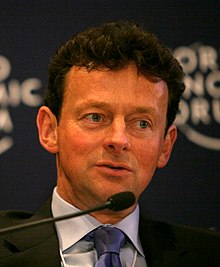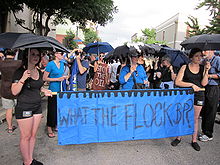Reactions to the Deepwater Horizon oil spill
[2] That same day he announced that he had dispatched the Secretaries of the Department of Interior and Homeland Security, as well as the EPA Administrator and NOAA to the Gulf Coast to assess the disaster.
Salazar has indicated that the Department of the Interior will also "issue a new order in the coming days that eliminates any doubt that a moratorium is needed, appropriate, and within our authorities.
A White House spokesman said the President's job was to keep his "boot on the throat" of the company, a similar phrase used by Interior Secretary Ken Salazar back on 2 May.
"[13] The President was later reported to have said that "his frustration over the mammoth oil spill in the Gulf of Mexico is not an attack on Britain" and that he had "no interest in undermining BP's value", as the two leaders tried to soothe trans-Atlantic tensions over the disaster.
[16] UK Prime Minister David Cameron stated that "sensible dialog" was needed[17] and BP would require certainty over its liability for compensation.
[20] The Netherlands also offered to prepare a contingency plan to protect Louisiana marshlands with sand barriers and a Dutch research institute developed a strategy to begin building 60-mile-long (100 km) dikes within three weeks.
[22] Allen explained on 11 June, "We have skimmed, to date, about 18 million gallons of oily water – the oil has to be decanted from that [and] our yield is usually somewhere around 10% or 15% on that".
The countries offering help were Canada, Croatia, France, Germany, Iran, Ireland, Mexico, the Netherlands, Norway, Romania, South Korea, Spain, Sweden, and the United Kingdom.
[citation needed] On 14 June Chris Huhne, the then UK Secretary of State for the Department of Energy and Climate Change, made a formal statement to the House of Commons, expressing sympathy to those affected, that the environmental consequences must take priority and that the UK Government would remain focused on practical measures to achieve this, including offering dispersants.
"[26] On 19 June, the Coast Guard actively requested skimming boats and equipment from the Netherlands, Norway, France, and Spain.
[27] On 29 June the State Department accepted 22 offers of assistance from 12 countries and international bodies, including two high speed skimmers and fire containment boom from Japan.
[28] A month after the French foreign minister volunteered a fleet of private oil-skimming boats, the owner met with BP and Coast Guard officials to present the idea.
[29] Jack Gerard, President of The American Petroleum Institute (API), stated that disasters are infrequent and that the Deepwater Horizon is an isolated incident.
they all agreed that industry needs to work harder at improving safety so that events like Deepwater Horizon do not occur in the future and that a more robust capacity to deal with them when they do is established.
Insurance Times reported an open letter from the Chairman of RSA Insurance Group, "the head of one of the country's leading companies",[12] to President Obama (text of letter) that expressed a concern over "double standards" compared to the sub-prime based banking crisis of 2007–2010 and over "prejudicial and personal" comments in the media.
[12][38] Initially BP downplayed the incident; CEO Tony Hayward called the amount of oil and dispersant "relatively tiny" in comparison with the "very big ocean.
[44][45] BP established a new division, headed by board member and managing director Bob Dudley to handle the company's response.
"[46] The company also ran print ads in newspapers including The New York Times, The Wall Street Journal, USA Today and The Washington Post.
[58][59] Korn eventually got the entire 2010 Mayhem Festival to join the boycott, and several other recording artists including Lady Gaga, Creed, Disturbed and Rise Against, among others.
"[63] The Organization for International Investment, a Washington-based advocate for overseas investment into the U.S., warned in early July that the political rhetoric surrounding the disaster is potentially damaging the reputation of all British companies with operations in the U.S.[64] and sparked a wave of U.S. protectionism that has restricted British firms from winning government contracts, making political donations and lobbying.
[66] An opinion poll conducted by Washington Post-ABC News in early June found that nearly three-quarters of Americans considered the spill a major environmental disaster.
Snow said that Obama "is now at war"[71] with BP, while America has taken no action on an arrest warrant issued for Warren Anderson, the former Union Carbide chief executive.
Framing theory explains how organizations, media, politicians, and businesses articulate their causes and advocate issues to their publics.
Research has shown that the way in which major news events are portrayed by the media influences how the public perceives them and how much importance is placed on the issues.
Criticism was focused on the spill's damage as well as the company's record of bypassing safety measures and violating environmental laws.
One study finds the media overwhelming used an "economic consequences frame," focusing on the cost the disaster would have for BP and how the company would make payments to victims.
The media coverage, citing both the scientific comments and President Obama's remarks, initially predicted a significant effect on the region and wildlife.
Photographs of injured birds, fish, and plants in the area were widely used in the media coverage of the event, though after the well was capped articles and news pieces changed their tone.
With an overwhelmingly anti-ecological perspective both Obama and Tony Blair portrayed the incident mainly in social terms, rather than environmental ones, and framed the event within the broader discourse of ecological modernization emphasizing the value of taming nature vs. a more holistic approach.
[75] 166 artists, writers, activists and intellectuals[74] — among them Naomi Klein, John Keane and Matthew Herbert — published a letter in the British newspaper The Guardian, on the day of the anniversary, urging the museum "to demonstrate its commitment to a sustainable future by ending its sponsorship relationship with BP".





